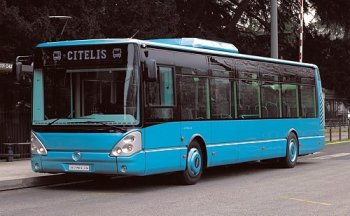|
Leading Czech
bus maker Karosa, which is owned by Iveco, sold a
record-high 1,883 buses during 2005, a growth of 180 units
year-on-year, reported Karosa Sales Director Petr Rusek.
In breaking the
1,800 vehicle
threshold. Exports to Western Europe played the main role
where last year’s sales rose considerably year-on-year,
especially in Italy and Germany. Further improvements are
expected in these markets during 2006.
Karosa recorded
their highest jump in Italy, where more than 200 buses
manufactured by the Czech firm have were sold last year,
three times last year’s figure. In 2006 further rises are
expected. Exports to Germany broke the barrier of one
hundred buses, i.e. a three-fold year-on-year increase
thanks to an order from the German Army, and this year looks
set to involve further increases involving dozens of buses.
Despite this
great dynamism, these two markets were nowhere near
attaining the volumes of exports made to Karosa's premium
market, France. A total of 879 buses found their way to
France last year, 8.4 percent up on 2004. An interesting
point is the fact that the recent success of Karosa's bus
exports to
France has served to significantly affected the overall trade balance
of the Czech Republic with France. Statistics regarding
mutual trade show that buses (delivered exclusively by the
company) now represent the fifth largest commodity exports from
the Czech Republic to France.
Karosa are
gratified that their products can hold their own in the
demanding and competitive environment of Western Europe,
which places the greatest demands on quality, technology and
the operating costs of the buses purchased. Exports to
Western Europe are expected to rise in 206 also, and will
thus help support the total planned sales for Karosa, which
should exceed the 2,000 buses barrier.
|

 |
|
The low-floor Citelis bus is offered by Karosa in
either standard format or an articulated version
which is based on an entirely new vision of urban
transport |
|
|
 |
|
Leading Czech bus maker Karosa, which is owned by
Iveco, sold a record-high 1,883 buses during 2005, a
growth of 180 units year-on-year |
|
|
Neighbouring country Slovakia accounted for 144 units, while 65 went to
Russian oil giant Surgutneftegaz.
In contrast
though, sales to the Czech market fell to 391 units, from
475 buses in 2004. "The Prague municipal transport company
did not buy any buses last year," said Rusek. In the past,
Karosa has sold about 100 buses a year to the capital city,
Prague.
Meanwhile just before
Christmas firm orders were finally put in place, following
the announcement earlier in 2005, of a huge public tender by
Paris Public Transport (RATP) for a delivery of a total of
1,171 vehicles. It followed months of waiting while Paris
decided who to select as its suppliers for the planned
expansion of its vehicle fleet. In the end there were two
winners, with the larger contract going to Irisbus.
The administrative board of RATP announced that almost 75
percent of the order would be supplied by Irisbus with 871
Citelis buses (365 of which have already been ordered). The
remaining 300 vehicles would be supplied by Scania (125
Omnicity vehicles have already been ordered).
The low-floor Citelis bus is offered by
Karosa in either standard format or an articulated version
which is based on an entirely new vision of urban transport.
Iveco took the whole of Karosa over after Renault left the Irisbus
set-up, the joint
venture the French firm had entered into with Iveco, three
years after the JV had been formed on
1st February 1999. Karosa - now one of the Czech Republic's
leading industrial companies - employs around 1,500 staff and build a
range that includes, city buses, intercity buses (which
straddle between bus and coach), coaches and mini buses,
which are modified from the Iveco Daily van range.
Karosa sales
1995-2005 (total/exports): 1999 (1235/673), 2000 (1251/778),
2001 (1319/749), 2002 (1554/1054), 2003 (1522/1014), 2004
(1703/1014), 2005 (1883/1492).
|
|
|
|
![]()
![]()